|
|
|
Sort Order |
|
|
|
Items / Page
|
|
|
|
|
|
|
| Srl | Item |
| 1 |
ID:
086958
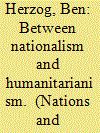

|
|
|
|
|
| Publication |
2009.
|
| Summary/Abstract |
The public and researchers alike view global/humanitarian and local/national logics as based on different, and even contradictory, regimes of justification. In this paper, however, I argue that these logics are complementary in the case of refugees. By asking 'who is a refugee?' within the Israeli case study, I empirically ground the claim that nationalism and humanitarianism should be grasped as Glocal. Content analysis of the Israeli case reveals how the Israeli establishment 'translates' the universal notion of humanitarianism. Humanitarian discourse does not offer an answer to the refugee problem by invoking a universal identity, nor is it just a euphemism for particularistic interests. On the contrary, the humanitarian logic is in fact based on the national order, and does not attempt to replace it. The political meaning of the term 'refugee' is an endless transcription of the national logic, and thus cannot be cosmopolitan.
|
|
|
|
|
|
|
|
|
|
|
|
|
|
|
|
| 2 |
ID:
086962
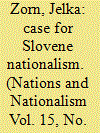

|
|
|
|
|
| Publication |
2009.
|
| Summary/Abstract |
When Slovenia became a sovereign state in 1991, it had to define who its citizens were. Were all residents of Slovenia, regardless of their ethnic belonging, equal in this respect? This article provides an answer to this question by elucidating certain parts of the secession legislation - the initial designation of citizenry and one of its indirect outcomes, the erasure from the register of permanent residents. The ethnic/civic dichotomy will be applied in order to demonstrate opposing nationalist claims made by the ruling elite. In terms of specific processes, Slovene nationalism will be presented in three distinct phases: counter-state nationalism (before the break-up of Yugoslavia), state-building nationalism (the initial designation of citizenry), and the nationalising state (after the secession; marked by the erasure and threats to revoke citizenship statuses of naturalised citizens).
|
|
|
|
|
|
|
|
|
|
|
|
|
|
|
|
| 3 |
ID:
086964
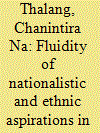

|
|
|
|
|
| Publication |
2009.
|
| Summary/Abstract |
Peace negotiations between the Indonesian government and the Free Aceh Movement (GAM) have resulted in the signing of the Memorandum of Understanding (MoU) ultimately ending a three-decade-long struggle for independence. Through a historical comparative analysis, this article explores the changing nature of Acehnese nationalism. It explores how Acehnese ethnicity and nationalism are constructed and how they have transformed over the decades in conflict with the Indonesian government. Acehnese ethnicity and nationalism, which are political in nature and ethnic in character, have ideologically shifted throughout time. Historical junctures and myths were utilised to legitimise these changing ideological goals. Despite the transformation of Acehnese nationalism and consequent changes in its ideological basis, a strong Acehnese identity still remains a constant.
|
|
|
|
|
|
|
|
|
|
|
|
|
|
|
|
| 4 |
ID:
086961
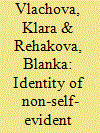

|
|
|
|
|
| Publication |
2009.
|
| Summary/Abstract |
In this study the authors analyse Czech national identity after the break-up of Czechoslovakia and before accession to the European Union. National identity is understood here as a construct consisting of several elements, four of which the authors analyse: territorial identity (localism, regionalism, patriotism, and Europeanism), the image of the nation - the cultural nation (ethno-nation) and the political nation (state-nation), national pride (in general, and in cultural performance and in the performance of the state), and love for the nation - nationalism (or more precisely, chauvinism) and patriotism. To create a more complex picture of Czech national identity the authors compare it with national identities in eleven other European countries. To conclude, the authors analyse the attitudes of Czechs toward the European Union, and national identity is used as an important explanatory element of the support for EU governance.
|
|
|
|
|
|
|
|
|
|
|
|
|
|
|
|
| 5 |
ID:
086963
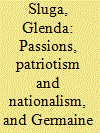

|
|
|
|
|
| Publication |
2009.
|
| Summary/Abstract |
This essay examines the influence of sentimentalism on conceptions of patriotism at the turn of the nineteenth century in order to historicise conventional views of the nature of patriotism as a fundamental human emotion. It uses a focus on the intellectual thought of Germaine de Staël in order to understand how a 'sentimental' view of patriotism took hold at a crucial moment in the European history of the idea of the nation and of the conceptualisation of emotions. I argue that de Staël's ideas and influence lead us to a radical reconsideration of the significance of the emotional history of patriotism for how we explain nationalism.
|
|
|
|
|
|
|
|
|
|
|
|
|
|
|
|
| 6 |
ID:
086960
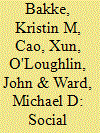

|
|
|
|
|
| Publication |
2009.
|
| Summary/Abstract |
This article examines attitudinal differences and similarities among ethnic groups in conflict-affected societies. Conventional wisdom tells us that societies that have experienced violent struggles in which individuals of different ethnic groups have (been) mobilized against each other are likely to become polarized along ethnic lines. Indeed, both policy-makers and scholars often assume that such divisions are some of the main challenges that must be overcome to restore peace after war. We comparatively examine this conventional wisdom by mapping dimensions of social distance among 4,000 survey respondents in Bosnia-Herzegovina and the North Caucasus region of Russia. The surveys were carried out in December 2005. Using multidimensional scaling methods, we do not find patterns of clear attitudinal cleavages among members of different ethnic groups in Bosnia-Herzegovina. Nor do we find patterns of clear ethnic division in the North Caucasus, although our social distance matrices reveal a difference between Russians and ethnic minority groups.
|
|
|
|
|
|
|
|
|
|
|
|
|
|
|
|
| 7 |
ID:
086959
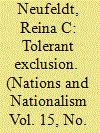

|
|
|
|
|
| Publication |
2009.
|
| Summary/Abstract |
During war, the demarcation 'enemy alien'- whether on ethnic or civic grounds - can lead to loss of political, social or economic rights. Yet not all minorities are excluded even though they pose problems for civic and ethnic national categories of belonging. This article explores the experiences of an ethno-religious minority who posed an intriguing dilemma for ethnic and civic categorisation in North America during World War II. The Mennonite experience enables a close examination of the relationship between a minority ethnic (and religious) group and majority concepts of wartime civic and ethnic nationalism. The article supports arguments that both ethnic and civic nationalism produce markers for the exclusion of minority groups during wartime. It reveals that minority groups can unintentionally become part of majority 'nationalisms' as the content of what defines the national ideal shifts over time. The experiences also suggest that a minority group can help mobilise symbolic resources that participate in transforming what defines the national ideal.
|
|
|
|
|
|
|
|
|
|
|
|
|
|
|
|
| 8 |
ID:
086965
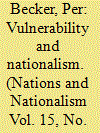

|
|
|
|
|
| Publication |
2009.
|
| Summary/Abstract |
This essay attempts to shed light on why aggressive ideas gain support within established western states. To do that it attempts to answer the question why the armed conflict against Iraq received such varied support during the first four months of 2003 within the United States, the United Kingdom, Australia, France and Spain. A comparative study indicates that the justifications for the armed conflict must be endorsed in the national identities of the particular states. If not, either the justifications or national identities have to be modified. The dominant elite emerge as essential to this process, as does the public experience of vulnerability. It appears that the war against Iraq received such varied support because the initial definitions of national identities endorsed the justifications for the war to different degrees, the dominant elites promoted different opinions and the people experienced different degrees of vulnerability.
|
|
|
|
|
|
|
|
|
|
|
|
|
|
|
|
|
|
|
|
|